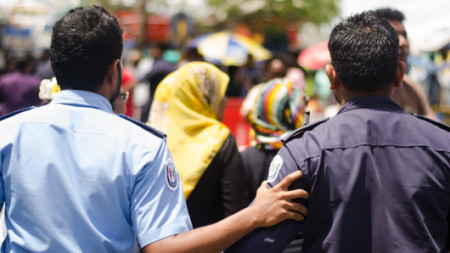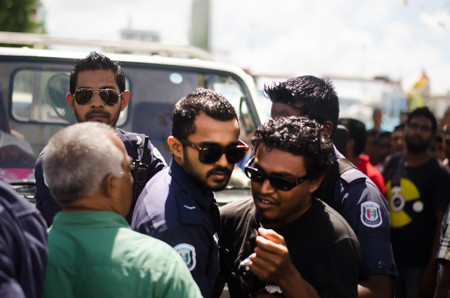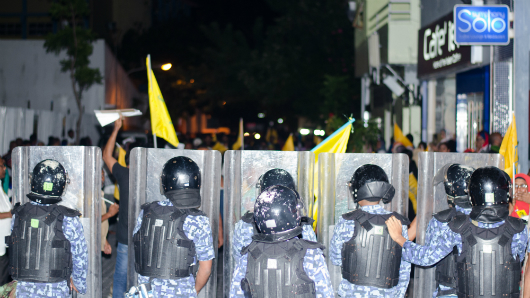The High Court today dismissed former President Mohamed Nasheed’s appeal challenging the legality of the Criminal Court’s February 22 arrest warrant, after the opposition leader asked for an open hearing.
The High Court denied Nasheed’s request, claiming neither members of the public nor journalists were allowed to observe appeal hearings.
The appellate court dismissed the case after the former president reportedly refused to enter the courtroom.
Hisaan Hussain from Nasheed’s legal team told reporters that the High Court had decided in a circular to hold closed hearings for appeals concerning arrest warrants.
She argued that the decision was in violation of Article 42 of the Constitution and Article 71 of the Judicature Act as circulars did not have the force of either laws or regulations that derived its authority from an act of parliament.
Nasheed’s lawyer, Hassan Latheef, told Minivan News that the legal team has decided to appeal the High Court’s decision at the Supreme Court.
Article 42 of the Constitution states that “trials of any matter shall be held publicly” while the presiding judge could exclude the public in the interest of public morals, order and national security, or where juveniles or the victim of the crime requires, and in cases where public interest would prejudice justice.
The opposition Maldivian Democratic Party (MDP) subsequently released a statement contending that the High Court did not have the legal authority to bar members of the public and journalists from observing hearings.
“By carrying out court proceedings in a manner that prevents constitutional rights and protection, the High Court is losing public trust, with the appeal process losing its meaning,” the MDP said.
Following the Criminal Court convicting Nasheed on terrorism charges on Friday night (March 13), Latheef said the legal team has requested the court report in order to appeal the 13-year prison sentence at the High Court within ten days.
A Supreme Court circular in January shortened the maximum appeal period from 90 days to ten days, claiming it would ensure the right to appeal in a timely manner.
“The Criminal Court informed us that the report will be provided in seven to 14 days,” said Latheef, noting that it would leave the defence team two days to prepare for the appeal hearing.
“Every aspect of this trial is very different from normal procedures followed by the courts,” he said.
President’s Office Spokesperson Ibrahim Muaz said yesterday that the government would ensure Nasheed’s right to appeal.
“I believe the Criminal Court would have afforded due process in the conduct of Nasheed’s trial. If you study this case, from the beginning to the end, it is clear the charges are not politically motivated,” Muaz insisted.
“We have a system of separation of powers. In a democracy, the head of state does not interfere in judicial proceedings and is not to blame for court proceedings,” Muaz said.
Nasheed was brought from the Dhoonidhoo detention centre to Malé around 1:30pm.
Hundreds of protesters were gathered near the High Court building, demanding the former president’s immediate release.
Police informed Minivan News that four individuals were arrested from the protest for allegedly obstructing police duties and for trying to harm police officers. Minivan News journalists observed police officers using pepper spray indiscriminately while making the arrests.
Throughout the Criminal Court trial, Nasheed maintained that he had been deprived of basic constitutional rights, including the right to legal counsel, right to appeal, and the right to be provided adequate time to prepare a defence. Judges also refused to hear defence witnesses claiming they did not appear to negate the prosecution’s case.
Delivering the guilty verdict Friday night, Judge Abdulla Didi said the prosecution’s evidence proved beyond reasonable doubt that Nasheed as commander-in-chief ordered the arrest or “forceful abduction” of Criminal Court Chief Judge Abdulla Mohamed in January 2012.
The former president was arrested on February 22 after Prosecutor General Muhthaz Muhsin personally sought an arrest warrant from the Criminal Court ahead of the surprise terrorism trial.
Related to this story
Former President Nasheed found guilty of terrorism, sentenced to 13 years in prison
Government will ensure Nasheed’s right to appeal conviction, says spokesperson
Respect Criminal Court verdict, says President Yameen
“This is not a court of law. This is injustice,” Nasheed tells the Criminal Court
MDP to launch national civil disobedience campaign to free Nasheed



